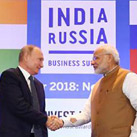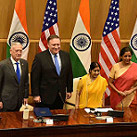Aleksei Zakharov
Publication
The Geopolitics of the US-India-Russia Strategic Triangle
The article deals with the state of play in the relationships between the United States, India and Russia. The focus of the article is placed on the geopolitical environment in which the three countries have been building their relationships in contemporary times. The author analyses the approaches of the US, India and Russia towards two geographical concepts of the Indo-Pacific and Eurasia. The situation in Afghanistan is examined through perspectives and interests of all three players as each of them is involved—though in a different manner—in the resolution of the crisis.
- Published: September 2019
No Place for Russia: European Security Institutions Since 1989
The dissolution of the Soviet Union, conflicts in former Soviet republics and in the Balkans, the war in Afghanistan and Iraq, the Arab Spring and the crisis in Syria, the war in Georgia and the confrontation in Ukraine—the last three decades have seen a series of events which affected the European security agenda. Since 1989, Russia has been participating in European affairs as a member of several forums and has been a party to multiple agreements.
- Published: March 2019
India-Russia Summit: Reading Between the Lines
The 19th bilateral summit has left a mixed feeling about the current state of the Indo-Russian relationship and its future prospects.
- Published: October 18, 2018
Will Modi-Putin Meet Boost Strategic Ties Between the Two Giants?
Visiting Fellow, IDSA, Mr Aleksei Zakharov’s article on India-Russia-third-bilateral-summit, titled ‘Will Modi-Putin Meet Boost Strategic Ties Between the Two Giants? Was published in The Quint on October 04, 2018.
The writer analyses the summit between Russian President Vladimir Putin and Prime Minister Narendra Modi and describes it as more promising than the previous meetings between the leaders.
- Published: 4 October, 2018
Is This the Revival of Russia-India Economic Ties?
Visiting Fellow, IDSA, Mr Aleksei Zakharov’s article on India-Russia relations, titled ‘Is This the Revival of Russia-India Economic Ties? Was published in The Diplomat on September 20, 2018.
Russia and India have shared interests that may lead them back to deeper cooperation, writes Mr Zakharov.
- Published: 20 September, 2018
The Arithmetic of India-U.S. Relations and the Russian Factor
India, on its way to become a global power, will likely have to follow a zigzag course, balancing between American demands, long-term friendship with Russia and its own strategic necessities in the neighbourhood and beyond.
- Published: September 17, 2018







